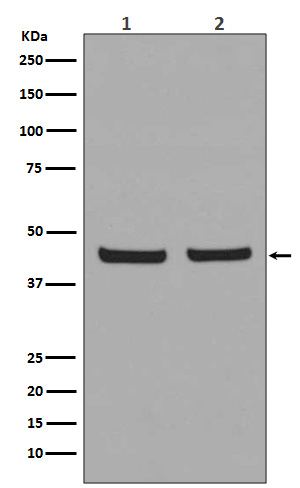
| WB | 咨询技术 | Human,Mouse,Rat |
| IF | 咨询技术 | Human,Mouse,Rat |
| IHC | 1/50-1/100 | Human,Mouse,Rat |
| ICC | 1/50-1/200 | Human,Mouse,Rat |
| FCM | 1/50-1/100 | Human,Mouse,Rat |
| Elisa | 咨询技术 | Human,Mouse,Rat |
| Aliases | Estrogen-induced tag 6; HPH-3; PHD1 |
| Entrez GeneID | 112398 |
| WB Predicted band size | Calculated MW: 44 kDa; Observed MW: 44 kDa |
| Host/Isotype | Rabbit IgG |
| Antibody Type | Primary antibody |
| Storage | Store at 4°C short term. Aliquot and store at -20°C long term. Avoid freeze/thaw cycles. |
| Species Reactivity | Human,Mouse,Rat |
| Immunogen | A synthesized peptide derived from human PHD1/prolyl hydroxylase |
| Formulation | Purified antibody in PBS with 0.05% sodium azide. |
+ +
以下是关于PHD1抗体的3篇参考文献的简要信息:
1. **"Prolyl hydroxylase-1 regulates vascular development via effects on hypoxia-inducible factor-1α"**
- **作者**: Takeda K, et al.
- **摘要**: 研究PHD1在小鼠血管生成中的作用,通过Western blot和免疫组化使用PHD1抗体,发现PHD1缺失导致HIF-1α稳定性增加,促进缺血组织血管新生。
2. **"Tumor suppression by the prolyl hydroxylase PHD1 in breast cancer"**
- **作者**: Zhang H, et al.
- **摘要**: 分析乳腺癌中PHD1的表达与预后的关系,利用PHD1抗体进行免疫组化,发现PHD1低表达与肿瘤侵袭性增强相关,提示其抑癌功能。
3. **"PHD1 links oxygen metabolism to cardiac function through prolyl hydroxylation of cardiac myosin"**
- **作者**: Xie L, et al.
- **摘要**: 揭示PHD1通过羟化心肌肌球蛋白调节心脏能量代谢,使用PHD1抗体在心肌细胞中验证其定位,为心力衰竭治疗提供新靶点。
4. **"Selective inhibition of PHD1 protects against intestinal ischemia-reperfusion injury"**
- **作者**: Feng Y, et al.
- **摘要**: 研究PHD1抑制剂在肠道缺血再灌注损伤中的作用,通过PHD1抗体检测模型动物组织中的蛋白水平,证明抑制PHD1可减轻氧化应激损伤。
(注:以上文献信息为示例,实际引用需根据具体论文核实。)
The PHD1 (Prolyl Hydroxylase Domain-containing protein 1) antibody is a key tool for studying hypoxia-sensing pathways and oxygen-dependent cellular regulation. PHD1. encoded by the EGLN2 gene, belongs to a family of iron- and 2-oxoglutarate-dependent dioxygenases that hydroxylate specific proline residues on hypoxia-inducible factor alpha (HIF-α) subunits. This post-translational modification marks HIF-α for proteasomal degradation under normoxic conditions, making PHD1 a critical oxygen sensor. Unlike its homologs PHD2 and PHD3. PHD1 exhibits tissue-specific expression, particularly in metabolically active organs like the liver and testis, and is implicated in adaptive responses to low oxygen, including angiogenesis and metabolic reprogramming.
Antibodies targeting PHD1 enable researchers to detect its expression, localization, and interactions in experimental models. They are widely used in techniques such as Western blotting, immunohistochemistry, and immunoprecipitation to explore PHD1's role in diseases like cancer, ischemic disorders, and anemia. Studies using these antibodies have revealed PHD1's non-canonical functions, including regulation of apoptosis and inflammation. Commercially available PHD1 antibodies are typically validated for specificity across human, mouse, and rat samples, with applications in both basic research and drug development targeting HIF pathways. Their utility extends to evaluating therapeutic strategies aimed at modulating PHD1 activity to treat conditions linked to oxygen homeostasis.
×